By Winona Sadia
Philippine Center for Investigative Journalism
Lack of gadgets, internet connections and training pose major problems for the
Department of Education when school opens on Oct. 5.
Is an ‘academic freeze’ warranted?
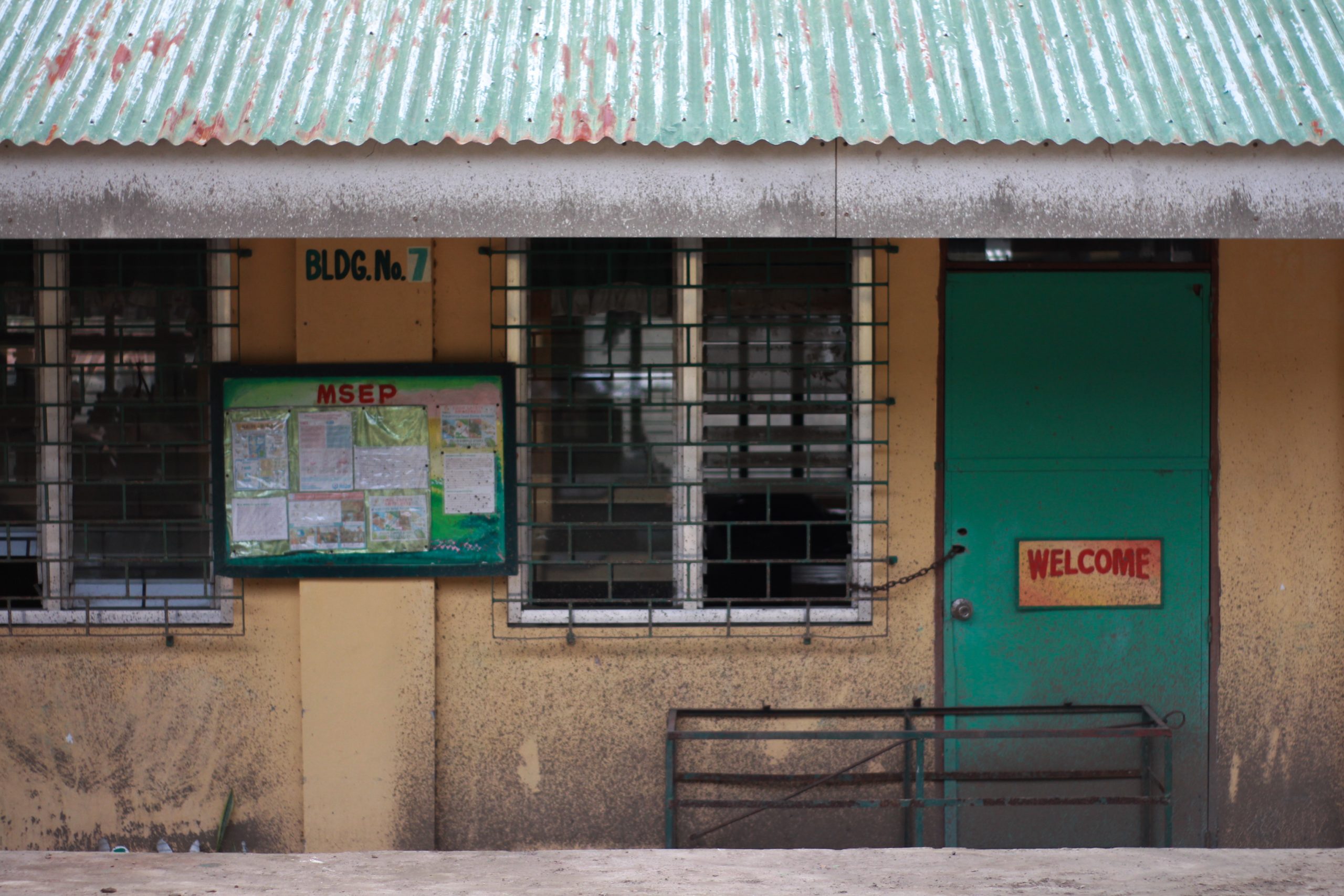
A building in Buso-Buso Elementary School in Laurel, Batangas is still mired with mud months after the Taal Volcano eruption in January 2020, in this photo taken on July 24, 2020. | Winona Sadia / PCIJ
Residents of Barangay Buso-Buso in Laurel, Batangas have more reason to be wary when school opens. The village was among the hardest hit when Taal Volcano erupted in January, and families were still scraping mud off their homes when the coronavirus pandemic struck. Confronted with two crises, teachers and parents in the barangay are left with no choice but to take their chances on distance learning come Oct. 5.
Teachers in Buso-Buso Elementary School, which expects about 200 enrollees, admitted they had yet to grasp the “new normal” in education, which requires internet access. Glenda Tenorio said some of her fellow teachers resorted to piso wifi stations – coin-operated machines selling metered wireless connections in nearby sari-sari stores – to go online for training and webinars.
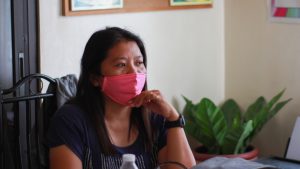
Teacher III Glenda Tenorio shares the difficulties faced by Buso-Buso teachers amid the shift to distance learning. | Winona Sadia / PCIJ
“Mahirap dito ang signal e, kahit kami nahihirapan. Kailangan din ng loadallowance, pang-internet (The signal here is bad and we’re having a hard time. We also need allowances for internet connection),” she said.
In July, teachers were forced to shell out up to P150 from their own pockets to attend a three-day webinar organized by the regional office of the Department of Education (DepEd). The “chalk allowance” was not enough, Tenorio said.
Students who do not own any gadget will have a more difficult time adjusting to distance learning, Tenorio told the Philippine Center for Investigative Journalism (PCIJ).
“‘Di naman lahat ng bata ay may gadget na magagamit. Kung meron man, sa ilang magkakapatid, isang cellphone lang. Iilan `yung kanya talaga (Not all kids have gadgets they can use. If there’s one, it’s a mobile phone shared by everyone. Only a few have their own gadgets),” she said.
The parents of Buso-Buso expressed willingness to adapt to the new normal, but were worried over the demands of the distance learning setup.
“Kapag ang bata minsan na sa bahay at gustong maglaro, hindi mo rin siya matutukan. ‘Pag sa school kasi parang takot pa sila sa teacher, parang naoobliga silang gumawa ng kanilang assignment (At home, the kids would rather play and you won’t be able to monitor them all the time. At school, they do what the teachers tell them to, and they are obliged to do their assignments),” said Gina Villalobos, parent of a Grade 2 student.
DepEd originally set the school opening on Aug. 24, but worries over the lack of preparation for the distance learning setup forced the government to postpone it to Oct. 5. Despite the six-week leeway, there are still no clear-cut solutions to the problems raised by the parents and teachers of Buso-Buso, which are shared by other parents and teachers across the country.
(See related story: For kids in special education, lockdown learning a must)
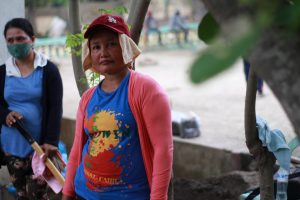
Parent Gina Villalobos participates in the cleanup drive in Buso-Buso Elementary School. | Winona Sadia / PCIJ
Lack of gadgets, digital skills
The lack of gadgets is not only felt in remote areas, but also in rich cities like Quezon City, which has 156 public schools.
Fernan Gana, president of the Quezon City Federation of Parents and Teachers Associations (QCFPTA), said the city government had provided 20 laptops for teachers in each school, but these were not enough.
“[Iyong] isang school na hawak ko, more than 200 ang teachers. Anong gagawin nila? Ang nakita ko sa DepEd, [lahat] ng problema wala sa kanila, ibinato nila sa LGUs. Kaya ang nakakaawa lang kasi ang mga LGUs (local government units) wala namang kakayahan (In one school under my supervision, there are more than 200 teachers. What are they going to do? What I see with DepEd, they toss the problems to the LGUs, which have no resources),” he said.
A survey conducted by DepEd in June found that tens of thousands of teachers nationwide lacked gadgets and internet connection needed for distance learning.
Out of nearly 700,000 teachers who responded, 87 percent had laptops or computers at home while 13 percent had none.Only 41 percent of those with gadgets had internet connections.
The survey also found that 49 percent had network signals but did not have internet connections in their households, while 10 percent lacked both.
More than the scarcity of gadgets and connectivity, many teachers did not have the digital skills needed to sustain online learning, Gana said.
“’Yung mga medyo mas matatandang teachers, hindi sila sanay sa paggamit ng internet. At the same time, medyo nahihirapan talaga sila kung paano gagawin ‘yung pagtuturo (The older teachers are not adept at using the internet. At the same time, they are struggling with how to teach online),” he said.
Not as effective as face-to-face classes?
Some teachers and parents feared distance learning would not be as effective as face-to-face learning.
In Buso-Buso, parents even appealed for limited face-to-face classes especially for “difficult” subjects, like English and mathematics, that they admitted they won’t be able to teach their kids.
“Karamihan sa amin ay hindi nakapag-aral din (Most of us didn’t go to school),” Villalobos said.
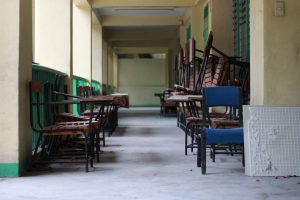
Chairs are stacked outside classrooms in GSIS Village Elementary School in Quezon City as workers make use of the prolonged summer vacation to renovate some school facilities. | Winona Sadia / PCIJ
Gana, a father of four, warned thatthe country’s standing in reading comprehension could go down further because of students’ prolonged gadget use.
He was referring to the 2018 Programme for International Student Assessment (PISA), where the Philippines ranked dead last in reading comprehension among 79 countries and economies. The worldwide study by the Organization for Economic Cooperation and Development gauged students’ knowledge in reading, mathematics and science.
“Kung bata pa lang e sasanayin natin sa paggamit ng gadgets, baka mawala`yung reading comprehension. [Hindi] katulad noon na naghahanap ka pa ng libro [at] binabasa mo, so nae-exercise ang reading comprehension mo [and] at the same time, `yung pagsasalita mo napa-practice (If children get used to gadgets at a very young age, reading comprehension might suffer. It’s unlike before when you had to find a book and read it, and your reading comprehension and communication skills are practiced),” he claimed.
Reading Association of the Philippines (RAP) President Frederick Perez allayed this fear, saying what mattered was the processing of ideas regardless of the learning modality.
“You can read the digitized format, you can read in printed format. [Just] clicking has no relation with [reading] comprehension. What is important is the processing of the text they’re reading,” he said.
“In this pandemic, it’s important that students [are] able to make meaning, and reading in a very technical term of transactional process should make meaning.”
Perez said distance learning would be an opportunity for parents to promote reading at home.
“We have to expose our students to authentic texts aside from the books, the audio books, aside from what is digital. [We] have to make all means to promote reading at home in families. Mahirap `yan gawin (That’s difficult) because the students are not in school,” he said.
Calls for ‘academic freeze’
With potential hiccups in distance learning emerging ahead of the reopening of schools, several groups said it might be best for the government to declare an “academic freeze.”
“Nagsabi na rin naman kami na baka ang panahon na best na magbukas ng klase ay January 2021. It will still be called School Year 2020-2021, wala namang problema doon (We have proposed the opening of classes in January 2021. It will still be called School Year 2020-2021, there’s no problem there),” Teachers Dignity Coalition Chairperson BenjoBasas told PCIJ.
Basas said the extra time should be used to further train teachers and gather resources for distance learning.
But RAP, which is composed of teachers handling reading classes, said an academic freeze might result in a “learning lag,” citing studies that found that some students had struggled to catch up upon returning to school from long breaks.
“For me, learning should continue, whatever modality it is.We just have to be prudent and wise in our choice of modality and it should be applicable to our children in our context in our locality. It’s too much to delay it for a year. For me, four months is enough,” Perez said.
Former education secretary Bro. Armin Luistro said giving distance learning a shot would be better than halting studies altogether.
“I think what is fair is we compare it not with face-to-face or ‘old normal,’ I think we should compare it with [staying at home and doing nothing, no lessons].Even if they (pupils) learn just half of the competencies, that is already a very important element in ensuring the continuity of learning,” he said.
Alberto Muyot, president of the nonprofit Save the Children, said it would be unfair to deprive students of learning, despite the limitations brought by the health crisis.
“Ang bata, lumalaki ‘yan with or without Covid-19. [Ang] matitigil natin, `yung face-to-face classes, pero ‘yung pag-aaral ng bata, patuloy ‘yun. We just have to be patient bilang mga magulang upang maturuan ‘yung mga bata (Kids will grow up with or without the Covid-19 pandemic. We can stop face-to-face classes, but learning must continue. As parents, we just have to be patient in teaching our children),” he said.
To fill the gaps in distance learning, Save the Children launched “Project ARAL” in partnership with DepEd, rolling out educational materials to be broadcast over TV and radio stations.
President Rodrigo Duterte earlier heeded the recommendation of DepEd to resume face-to-face classes in areas with low Covid-19 transmission starting January 2021.
Groups are now urging government agencies to put in place safety measures for pupils and students.
“Tayo naman po ay naniniwala na wala pa ring papalit sa face-to-face learning bilang best modality ng pagtuturo (We still believe that face-to-face learning is irreplaceable as the best modality of teaching),” ACT’s Basilio said.
“However, sa panahon ng pandemya, kailangang matiyak ‘yung kaligtasan ng bawat guro [at] mag-aaral. Pinu-push natin na magkaroon ng clinics, sapat na health workers, at sapat na kinakailangan sa eskwelahan para matiyak na ligtas ito (However, in a pandemic, we have to ensure the safety of all teachers and students. We are pushing for clinics, an adequate number of health workers, and other resources needed by schools to make sure they are safe),” he added.
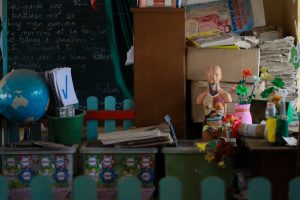
A classroom in Buso-Buso Elementary School, left unused since the Taal Volcano eruption in January, has yet to be fixed. | Winona Sadia / PCIJ
‘Learning must continue’
Perez said it was time to integrate new skills in the curriculum.
“Teachers and parents should be ready to face the new normal with new modalities in reading, writing, speaking, listening, viewing and presenting. [The] new normal calls for new skills, actually, skills that have not been given importance like listening and speaking and then viewing and presenting,” Perez said.
San Antonio stressed the need for communication between parents and teachers.
“Communication will be a very important aspect of our distance learning delivery modality,” he said.
For his part, DepEd Undersecretary Nepomuceno Malaluan said the pandemic might be an opportunity to elicit greater participation among parents in their children’s learning process.
“For quite some time, [there’s] been a much greater reliance of our households on the schools for the learning process of their children, which is not really the ideal because a lot of learning has to happen at home,” he said.
Villalobos, one of the Buso-Buso parents, admitted that playing a bigger role in her children’s learning process would be difficult.
“Kahit anong mangyari, ginagapang namin ‘yung mga bata sa pagpasok. ‘Yan lang naman ang maipamamana namin sa mga bata (We will do whatever it takes to keep our children in school. The only thing we can bequeath them is education).”
As of Sept.28, DepEd has recorded a total of 24,661,788 enrollees in public and private schools combined for the upcoming school year. Of the total, 22,460,996 were registered in public schools.
The education department logged 27.7 million enrollees last year, 22.5 million of which were in public schools. –PCIJ, September 2020
Winona Sadia finished AB Journalism at the University of Santo Tomas. She works as a TV news producer. You may reach her on Twitter (@winonymous) or at sadiawinona@gmail.com for comments or suggestions.